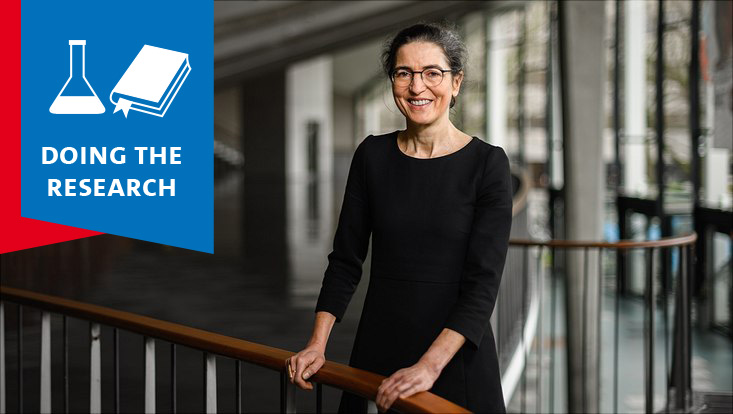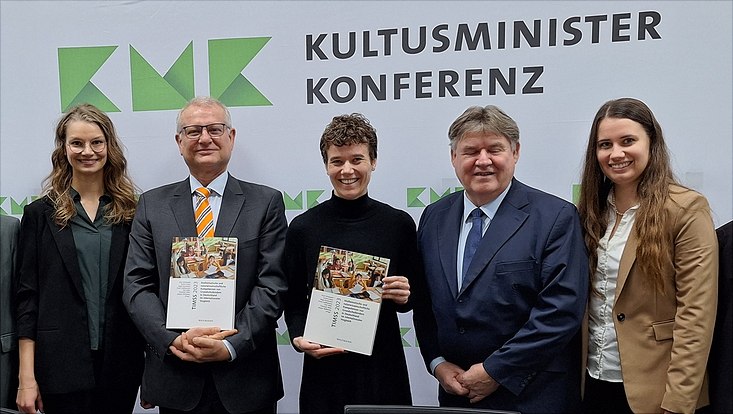New EU collaborative projectNetworks and the Rule of Law
12 November 2024, by Newsroom editorial office

Photo: University of Hamburg/Esfandiari
The rule of law has to be defended again and again. The role that human networks such as clubs or associations play to strengthen or weaken the rule of law is now being studied in the project NET-ROL: Networks and the Rule of Law: Uncovering Socioeconomic Outcomes. Prof. Dr. Stefan Voigt and Prof. Dr. Jerg Gutmann from the University of Hamburg are also involved. NET-ROL is one of 4 new projects at the University of Hamburb being funded by the European Union.
To procure masks using public funds, politicians received fairly high sums during the corona pandemic. There were repeated reports that lobby groups influenced legislation. These networks can corrode the population’s trust in the rule of law and public institutions. At the same time, many civic networks, such as associations and organizations, advocate for the rule of law, thereby strengthening it.
NET-ROL: Networks and the Rule of Law: Uncovering Socioeconomic Outcomes will look at the effects different types of networks have on the perception and constancy of the rule of law. The project will focus in particular on the socioeconomic consequences of economic growth or loss of trust. The research alliance is being funded in the amount of about €3 million as part of the European HORIZON program, with €628,000 going to the University of Hamburg, where Voigt and Gutmann from the Faculty of Law are involved in the project.

In a subproject, Jerg Gutmann, professor of behavioral law and economics, and his team are developing an instrument that will make it possible to uniformly measure the level of the rule of law. To do so, they are developing a new indicator for the rule of law that consolidates data from different information sources. “The indicator will not only allow us understand the level of the rule of law in nation states over decades, but also form the basis for uncovering the connections between network structures and changes in a country’s level of rule of law,” explains Gutmann.
Eight universities, various disciplines

The subproject coordinated by Voigt, professor of law and economics, will also contribute to our understanding of the rule of law, particularly its emergence. Concretely, it will focus on historical values and norms that have long-term impact on the rule of law. Because these cannot currently be assessed, Voigt and his team are evaluating thousands of fairy tales from European countries in order to document the values and norms they communicate. “On this basis, we can look at whether these values are reflected differently in today’s level of rule of law. And we can see them in relation to the activities and perception of networks,” says Voigt.
The research alliance encompasses 8 universities from Germany, Austria, the Netherlands, the Czech Republic, France, and Italy as well as 2 think tanks from North Macedonia and Poland. Researchers work in various fields, such as economics, political science, law, and informatics. They will be using methods of data and network analysis, including machine learning tools, and surveys and text analyses.
Three more EU-funded projects
The NET-ROL project is one of 4 new EU research alliance projects involving University of Hamburg researchers.
Prof. Dr. Alexander Bassen from the Faculty of Business, Economics and Social Sciences and the Cluster of Excellence Climate, Climatic Change, and Society (CLICCS) is heading a subproject in the alliance titled NATURE-3B, which is being coordinated at the University College in Dublin. This project will look at, among other things, guidelines and orientation for developing sustainable investments.
Prof. Dr. Jana Sillmann from the Cluster of Excellence Climate, Climatic Change, and Society (CLICCS) will contribute to the FAIR2Adapt to Climate Change project by ensuring that European regions and local authorities have easier access to climate research data and services. According to Sillman, “based on the Hamburg heat protection plan, relevant climate and socioeconomic data should be rendered usable to better warn at-risk population groups and to purposefully plan investments in protective infrastructure."
Prof. Dr. Tom Stargardt from the Hamburg Center for Health Economics and the University of Hamburg Business School is doing research as part of the large-scale project Early Treatment of Atrial Fibrillation for Stroke Prevention Trial in Acute STROKE (EAST-STROKE), which is being coordinated at the University Medical Center Hamburg-Eppendorf. The focus of this is the evidence-based prevention of further strokes in stroke, meaning especially high-risk patients. Stargardt is also conducting a health economics evaluation as part of this.


